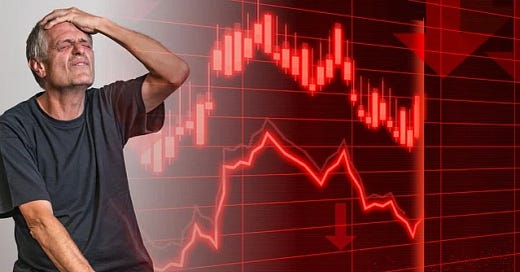Financial “events” are usually a surprise. Afterwards, everybody likes to quote Hemmingway (or sometimes incorrectly, F. Scott Fitzgerald). “How did you go bankrupt?” Bill asked. “Two ways,” Mike said. “Gradually and then suddenly.” (It’s in The Sun Also Rises.) We should have seen the financial crisis coming—but it comes slowly enough that nobody really notices until it’s too late.
We now have no less than three (3) potential sources of immediate trouble. And they are likely to happen faster than we might think. Let’s have a look.
The budget and debt ceiling
As of this writing, it is beginning to look like this risk is receding. The House managed to do the easiest part of the budget process—pass the broad budget bill. It includes the most critical thing for financial markets, which is raising the debt ceiling. Now the House and Senate have a couple of weeks to agree on the final proposal. Without a hike in the debt ceiling, the US government will eventually miss paying for something—Social Security, Medicare, or pension payments. The worst possibility might well be a missed interest payment on Treasury bills. That could trigger very nasty problems in accounting and in short-term interbank lending. See the description here from the last time this was a problem. The short version: insolvent banks, financial markets in free fall, and probably a spell of a shrinking economy and high unemployment.
Keep in mind that there is an out. Back in 2023, some authorities argued that the debt ceiling itself is unconstitutional, and that President Biden could simply ignore it. (See here for an example.) President Trump, who is much less modest in his view of Presidential power, could well seize on these arguments to continue issuing debt and paying the government’s bills. That would reduce, but not eliminate the impact. Uncertainly would remain for weeks, perhaps months, until the matter was decided definitely by the Supreme Court.
Tariffs
The reaction of financial markets to President Trump’s announcements about tariffs make pretty clear what would happen if he follows through. The shock here will be transmitted through the stock market, and especially (although not exclusively) through manufacturing firms. As the current capital stock in North America is based on the assumption that goods can move freely between Mexico, the United States, and Canada, the imposition of tariffs would amount to a huge depreciation of the capital stock. Stock prices would have to reflect this. And, of course, the high adjustment costs would include a likely recession and high unemployment, meaning that even firms without a high investment in free North American goods movement would be affected.
As long as the President doesn’t actually impose these tariffs, investors appear to be willing to allow for smaller or more detailed tax hikes. But the markets have clearly demonstrated that the full deal will create a big financial shock.
Crypto
It’s hard to imagine something better designed to create a financial boom and bust than crypto. The “asset” doesn’t have any value itself. That’s not necessarily wrong, but it’s hard to see crypto as a real competitor to current electronic money. Our current system is quite expensive, but crypto doesn’t seem to be any cheaper, it doesn’t seem to have any ability overcome the network effects of the current payment system, and the lack of regulation is a significant negative—your money is simply safer in an FDIC insured bank than in a crypto wallet. (My ex-colleague Sam Friedman has a great analysis of crypto here).
Crypto accounts promising to pay 10% to 15% interest are a tip off that these assets are extremely risky. Most economists peg the real risk-free return to capital at about 2%. There are no investments that pay like those crypto accounts without taking on large amounts of risk. What appears to be happening is that the crypto issuers can pay such high interest either because they are running Ponzi schemes or because they are highly leveraging the investments made possible by those deposits. Either way will lead to tears.
I’m not sure crypto itself will lead to a crash, and it certainly won’t very soon; there is plenty of demand for the “asset” right now given the attitude of the Administration and Congress. But that won’t last. And a financial crash from another source (like tariffs) could easily be accelerated by the crypto sector. Especially if non financial firms and traditional banks have taken on significant positions in it.
What to do?
I don’t give financial advice. But while the immediate prospect is disturbing, I think that the overall health of the US economy in the long term remains good. Anybody reading this should know enough to invest for the long run. That means that short-run financial shocks don’t matter very much, and might even be opportunities. Any further questions, do what I do and talk to a financial advisor who can suggest the best ways to ride out the coming storm. Hemmingway’s “suddenly” may be here faster than we expect.
And after the crash, I propose a drinking game: chug a beer every time you hear somebody mention that quote and chug two beers when somebody misattributes it to F. Scott Fitzgerald. Too many Wall Street people don’t bother to fact check.



